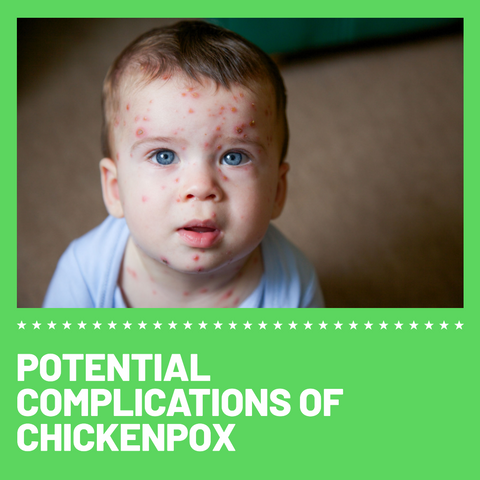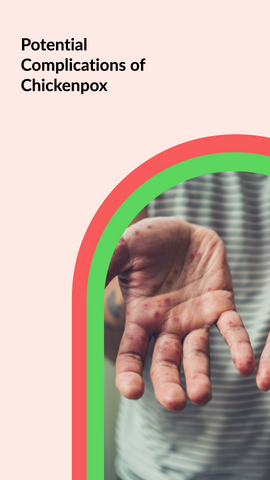
What are the Potential Complications of Chickenpox?
Disclaimer:
This article is for informational purposes only and should not be considered medical advice. The content is not a substitute for professional medical consultation, diagnosis, or treatment.
Always consult a healthcare professional for personalised medical advice.
We are not liable for any actions taken based on the information provided in this article. For more information on various health and wellbeing topics, feel free to explore our blog.
Overview of Chickenpox
Chickenpox is an infectious disease caused by the varicella-zoster virus.
It's widely recognised by the itchy, fluid-filled blisters that adorn the skin during an outbreak. However, underneath these physical manifestations, the virus can incite a plethora of complications.
If you're interested in understanding how long the virus can survive on surfaces, check out our detailed article on - How long does chickenpox virus live on surfaces.
Common Complications of Chickenpox
Bacterial Infections
One of the most common complications arising from Chickenpox is bacterial infections.
These primarily afflict the skin, blood, and soft tissues, especially in children (1).
Scratching the itchy blisters increases the risk, as it opens up a pathway for bacteria to invade the body.
Pneumonia
Pneumonia is a severe respiratory condition that can occur as a complication of Chickenpox.
While chickenpox is primarily known to cause skin rashes and fever, the varicella-zoster virus responsible for chickenpox can spread to the lungs, leading to an infection known as varicella pneumonia.
This is especially common in adults, newborns, and individuals with weakened immune systems. 
Varicella pneumonia can cause symptoms such as difficulty in breathing, chest pain, persistent cough, and high fever. In more severe cases, it may cause shortness of breath, even when at rest.
Fatigue, loss of appetite, and bluish lips or face due to lack of oxygen can also occur.
It's a serious complication that requires immediate medical attention as it can be life-threatening.
Encephalitis
Encephalitis, or inflammation of the brain, is another potential, albeit rare, complication of chickenpox.
Encephalitis can occur when the varicella-zoster virus spreads to the brain. This is often a serious complication, given the critical nature of the brain to our bodily functions.
Symptoms of encephalitis include severe headaches, nausea, vomiting, high fever, and seizures.
More severe signs include confusion, agitation, hallucinations, or even a loss of consciousness. It can lead to long-term neurological issues, such as cognitive impairments, behavioural changes, and movement disorders.
Immediate medical treatment is essential when encephalitis is suspected to prevent these severe consequences.
Dehydration
Dehydration, although seemingly less serious than pneumonia or encephalitis, can be a notable complication of chickenpox.
This primarily occurs when the individual affected by chickenpox is unable to maintain sufficient fluid intake. It can be particularly challenging if painful sores caused by the chickenpox virus develop in the mouth and throat, making eating and drinking difficult.
Symptoms of dehydration include extreme thirst, dry mouth, decreased urine output, and fatigue.
In severe cases, it can lead to confusion, rapid heart rate, and loss of consciousness.
This complication underscores the importance of ensuring adequate fluid intake when battling chickenpox to maintain hydration and support overall recovery.
Severe Complications of Chickenpox
Hemorrhagic Complications
Hemorrhagic complications represent a severe form of chickenpox, often resulting from issues with the body's clotting mechanism.
Such complications can lead to spontaneous bruising, bleeding from the nose or gums, or bleeding into the skin, manifesting as petechiae (pinpoint, unraised, round red spots under the skin). 
In rare cases, it can lead to life-threatening bleeding into vital organs.
These bleeding issues can occur before the typical chickenpox rash appears or simultaneously.
Hemorrhagic chickenpox requires urgent medical attention and can necessitate hospitalisation.
Toxic Shock Syndrome
Toxic Shock Syndrome (TSS) is an extremely rare but life-threatening complication of chickenpox.
It's caused by toxins produced by certain strains of bacteria, often introduced into the body through skin lesions from chickenpox.
TSS can affect a multitude of body systems, leading to sudden high fever, low blood pressure, and organ failure, which can be fatal if not treated promptly.
Other symptoms can include rash, redness of eyes, lips and tongue, and severe muscle aches. Immediate medical intervention is necessary when TSS is suspected.
Reye's Syndrome
Reye's Syndrome is a rare but serious condition that can occur if children or teenagers with chickenpox are given aspirin.
This disease causes severe damage to the liver and brain, leading to sudden and potentially life-threatening complications.
Symptoms include persistent vomiting, listlessness, loss of energy, and rapid breathing.
As the condition progresses, it may lead to personality changes, confusion, seizures, and loss of consciousness.
The best prevention strategy is to avoid giving aspirin to children and teenagers who have chickenpox or flu-like symptoms.
Liver Problems
Although rare, liver complications can arise from a chickenpox infection.
The varicella-zoster virus can cause inflammation and infection in the liver (hepatitis), leading to symptoms such as abdominal pain, jaundice (yellowing of the skin and eyes), and elevated liver enzymes detected in blood tests.
In severe cases, chickenpox hepatitis can lead to liver failure, although this is extremely rare. It's vital to seek medical help if any signs of liver problems are observed in someone with chickenpox.
High Risk Individuals and Complications of Chickenpox
While Chickenpox can lead to complications in any affected individual, some groups are at a higher risk.
These include infants, adolescents, adults, and pregnant women. People with weakened immune systems, due to illness or medications, are also at heightened risk.
Warning Signs and Symptoms
In the event of these complications, certain symptoms might signal their onset.
These include lack of energy, drowsiness, confusion, seizures, vomiting, severe headaches, stiff neck, behavioural changes, and problems with walking, balance, or speech.
If any of these symptoms are observed, immediate medical attention is crucial.
Preventing Chickenpox
Prevention is always better than cure, especially when dealing with infectious diseases like chickenpox.
The primary method of preventing chickenpox is vaccination, which is usually administered during childhood.
It's highly effective and often provides long-term immunity against the virus. Additionally, maintaining good hygiene practices, such as regular hand washing and avoiding close contact with infected individuals, can also help reduce the risk of transmission.
If you're unsure about your chickenpox vaccination status, consulting a healthcare provider is a sensible course of action.
By including this information, the reader will not only understand the potential complications of chickenpox but also grasp practical measures to avoid the disease altogether.
The article, thus, becomes a comprehensive guide, covering not just the problem but also a part of the solution, without straying from the primary intent.
In Summary
Whilst Chickenpox is typically a mild illness, its potential complications underscore the seriousness it can evolve into.
Being aware of these complications, recognising their symptoms, and knowing the risk groups can be pivotal in managing Chickenpox effectively.
Always remember, when it comes to health, prevention is better than cure and awareness is the key to prevention.
FAQs
Can a parent of a child with chickenpox pass it on?
Chickenpox is a highly contagious disease and can be transmitted to others through direct contact with the rash, or through the air when someone with the infection coughs or sneezes. If you, as a parent, have not previously had chickenpox or been vaccinated against it, there's a risk that you could contract the virus from your child and then transmit it to others. For further details, feel free to read our article Can a parent of a child with chickenpox pass it on?.
Are there any long-term effects of chickenpox?
In most cases, people fully recover from chickenpox without any long-term effects. However, the varicella-zoster virus can remain dormant in your body and reactivate years later, causing a condition called shingles. Shingles can cause a painful rash, and, in some cases, long-term pain (postherpetic neuralgia). It is also important to note that the scars left from severe chickenpox blisters can sometimes be permanent. For more information, you can read - What are the odds of getting chickenpox twice on our blog.
What happens if I have chickenpox? Can I still go to work or school?
If you or your child has chickenpox, it's important to avoid public places where you could spread the virus to others who may not be immune. For working parents, it could raise questions like, Can I go to work if my child has chickenpox?. Similarly, when it comes to resuming school, the question - When can my child go back to school after chickenpox? can often arise. Click on the links to find the answers to these questions.
Is vomiting a symptom of chickenpox?
While chickenpox is usually associated with an itchy rash, fever, and fatigue, some people may also experience gastrointestinal issues such as vomiting. To learn more about this, you can read our article - Does chickenpox cause vomiting?.
